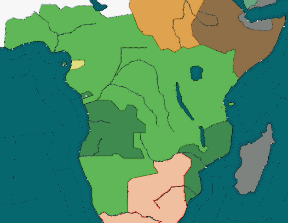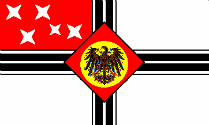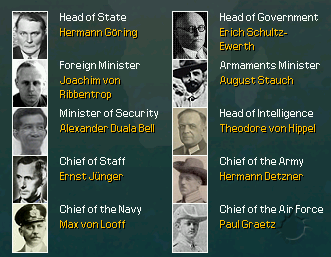Mittelafrika
From Kaiserreich
MaskedPickle (Talk | contribs) |
|||
| Line 29: | Line 29: | ||
|'''Official Language''' || [[Germany|German]] | |'''Official Language''' || [[Germany|German]] | ||
|- | |- | ||
| - | |'''Capital''' || [[ | + | |'''Capital''' || [[Dar-es-Salaam]] |
|- | |- | ||
|'''Head of State''' || [[Hermann Göring]] | |'''Head of State''' || [[Hermann Göring]] | ||
| Line 44: | Line 44: | ||
|- | |- | ||
|'''Area''' | |'''Area''' | ||
| - | |More than | + | |More than 5 million km² |
|- | |- | ||
|'''Population''' | |'''Population''' | ||
| Line 96: | Line 96: | ||
== Culture == | == Culture == | ||
| + | Mittelafrika spans over a vast region of Africa, being one of the largest countries in the world. Thus, one single recognizably Mittelafrikan culture does not present itself. German culture is dominant in the areas that made up the pre-Weltkrieg German colonies and the former areas held by Britain, Belgium and France all have their distinct cultural and social setups. | ||
| - | + | [[Category:Countries]] [[Category:German-related topics]] [[Category:African countries]] [[Category:African-related countries]] [[Category:Mitteleuropa]] | |
| - | [[Category:Countries]] [[Category:German-related topics]] [[Category:African countries]] [[Category:African-related countries]] | + | |
Revision as of 11:06, 4 September 2008
| ||||
| Motto Gott mit Uns (God with us) | ||||
| Anthem Heil dir im Siegerkranz | ||||

| ||||
|
| ||||
| Official Language | German | |||
| Capital | Dar-es-Salaam | |||
| Head of State | Hermann Göring | |||
| Head of Government | Erich Schultz-Ewerth | |||
| Establishment - Proclaimation of the Freistaat Mittelafrika | November, 2 1925 | |||
| Government | Autonomous colonial free state under authority of the German Empire | |||
| Currency | German Central African rupie | |||
| Area | More than 5 million km² | |||
| Population | Around 52 million | |||
Mittelafrika, or officially Freistaat Mittelafrika (German for Free State of Central Africa)is a country in Africa. It is bordered to the north by the territory controlled by the French government in exile, Egypt-Sudan and Abyssinia; to the east by the Indian Ocean and the Portuguese colony of Mozambique; to the south by South Africa; and to the west by the Atlantic Ocean, the Portuguese colony of Angola and the Spanish colony of Equatorial Guinea.
Freistaat Mittelafrika is an autonomous colonial free state, reuniting colonies that belonged prior to the Weltkrieg to the colonial empires of Germany, Britain, France and Belgium, which were granted a status of autonomy by the Kaiser Wilhelm II and Reichskanzler Alfred von Tirpitz on November, 2 1925. The dominant state in Africa is still bound to the German Empire by a military and economic subordination.
Contents |
History
Mittelafrika was created after the 1921 treaty by a victorious Germany, with the aim of centralising the governing of Germany's newly acquired African colonies under one administration headed by Paul von Lettow-Vorbeck, the undefeated commander of German forces in East Africa during the war. Almost from the start Mittelafrika became a semi-autonomous region, with its own government and its own armed forces. Its territories were greatly expanded in 1925 when the political turbulence in England caused Germany to move troops into Britain's African colonies and from this point on the Freistaat was the hegemonic political force in Africa, if only due to its size.However it remained economically backwards, sucking in German money and manpower for little return gain, as minor colonial insurrection continually plagued it through the 1920's and 30's. In 1934 Lettow-Vorbeck was replaced by Hermann Goering- a politician whose actions and right-wing extremist views were embarrassing the Kaiser's government. Goering saw the move as an opportunity to create his own power base, and by 1936 has begun to enlarge the army and now looks greedily at his neighbours, especially the Portuguese colonies and the native state of Abyssinia.
German entry in the Scramble for Africa
The Mittelafrikaprojekt
Politics
|
Staathalter: Hermann Göring (born 12 January 1893)
Vice-Staathalter: Erich Schultz-Ewerth (born 8 March 1870)
Secretary for Relations with Germany: Joachim von Ribbentrop (born 30 April 1893)
Secretary for Economic Exploitation: August Stauch (born 15 January 1878)
Secretary for Security Issues: Prince Alexander Duala Manga Bell (born 3 December 1893)
Head of the local branch of the Abwehr: Colonel Theodore von Hippel
Chief of General Staff of the Colonial Army: Colonel Ernst Jünger (born 29 March 1895)
Commander-in-Chief of the Colonial Ground Forces: Hermann Detzner (born 16 October 1882)
Commander-in-Chief of the Colonial Navy: Max von Loof
Commander-in-Chief of the Colonial Air Force: Paul Graetz (born 25 July 1885)
Military
Foreign relations
Culture
Mittelafrika spans over a vast region of Africa, being one of the largest countries in the world. Thus, one single recognizably Mittelafrikan culture does not present itself. German culture is dominant in the areas that made up the pre-Weltkrieg German colonies and the former areas held by Britain, Belgium and France all have their distinct cultural and social setups.


